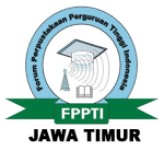Promotional Strategy as Maintaining Efforts User Loyalty of Information Services in Library College
Downloads
Background of the study: Libraries have various challenges in maintaining their existence as information providers. Libraries must have support so that users do not turn to other services, have special strategies to connect themselves, establish good relationships, and provide user loyalty.
Purpose: The purpose of this agreement is to describe the promotion strategy as an effort to encourage the loyalty of university library users.
Method: The method used in this research is literature study and also uses the author's active participation observation method as a librarian in the university library.
Findings: According to the results of research and literature study by the author, various university libraries provide various types of businesses. The results of the author's discussion there are several discussions about the library promotion strategy arrangement published; (1) Discussion of steps and targets in publicizing and promoting information services; (2) determining the promotion goals by specifying the type of user; (3) a budget is issued; (4) selecting the media used for publication and promotion; (5) evaluating various types of media that have been used; (6) the promotion process in terms of human resources, infrastructure, and various types of librarian activities.
Conclusion: With the arrangement of the strategic promotion library model, the authors submit an opinion about the college library that provides a promotional strategy as a promotional container and guarantee self-existence.
Downloads
Assauri, Sofjan. (2012). Stategic Marketing: Sustaining Lifetime Customer Value. Ed.1. Jakarta: Rajawali Pers.
Griffin, Jill. (2005). Customer Loyality: Menumbuhkan dan Mempertahankan Kesetiaan Pelanggan. Jakarta: Erlangga.
Indrajit, Richardus Eko. 2011. Peranan Teknologi Informasi dan Internet. Yogyakarta: Andi Offest.
Kotler, Philip. (2000). Marketing Management. Edisi Milenium. Inc New Jersey: Prentice Hall Intl.
Kotler, Philip (2000). Prinsip –Prinsip Pemasaran Manajemen. Jakarta: Prenhalindo.
Kotler, Philip dan Kevin Lane Keller. (2007). Manajemen Pemasaran. Edisi 12 Bahasa Indonesia (Jilid 1). Jakarta: Indeks.
Kotler, Philip dan Kevin Lane Keller. (2007). Manajemen Pemasaran. Edisi 12 Bahasa Indonesia (Jilid 2). Jakarta: Indeks.
Kotler, Philip dan Kevin Lane Keller. (2007). Manajemen Pemasaran. Edisi 13 Bahasa Indonesia (Jilid 1). Jakarta: Indeks.
Kotler, Philip dan Andreasen, Alan R. (1995). Strategi Pemasaran Untuk Organisasi Nirlaba Edisi Ketiga. Yogyakarta: Gadjah Mada Press
Lasa HS. (2005). Manajemen Perpustakaan. Yogyakarta: Gama Media.
Lucas, Robert W. (2005). Customer Service: Building Succesfull Skills for The Twenty-first Century. Third edition. New York: McGraw Hill Irwin.
Pemerintah Republik Indonesia. (2007). Undang-Undang Nomor 43 Tahun 2007 Tentang Perpustakaan. Indonesia: Pemerintah Republik Indonesia.
Perpustakaan Nasional RI. (2015). Standar Pelayanan Perpustakaan Dan Informasi Bidang Layanan Koleksi Umum Perpustakaan Nasional RI. Jakarta: Perpustakaan Nasional RI.
Purwono. (2013). Profesi Pustakawan Menghadapi Tantangan Perubahan. Yogyakarta: Graha Ilmu.
Rangkuti, Freddy. (2001). Analisis SWOT Teknik Membedah Kasus Bisnis. Jakarta: Gramedia Pustaka Utama.
Sulistyo-Basuki. (1993). Pengantar Ilmu perpustakaan. Jakarta: Gramedia.
Sutabri, Tata. (2014). Pengantar Teknologi Informasi. Edisi Pertama. Yogyakarta: Penerbit Andi.
Record and Library Journal by Unair is licensed under a Creative Commons Attribution-ShareAlike 4.0 International License.
1. The journal allows the author to hold the copyright of the article without restrictions.
2. The journal allows the author(s) to retain publishing rights without restrictions
3. The legal formal aspect of journal publication accessibility refers to Creative Commons Attribution Share-Alike (CC BY-SA).
4. The Creative Commons Attribution Share-Alike (CC BY-SA) license allows re-distribution and re-use of a licensed work on the conditions that the creator is appropriately credited and that any derivative work is made available under "the same, similar or a compatible license”. Other than the conditions mentioned above, the editorial board is not responsible for copyright violation.


 57201398420
57201398420

























